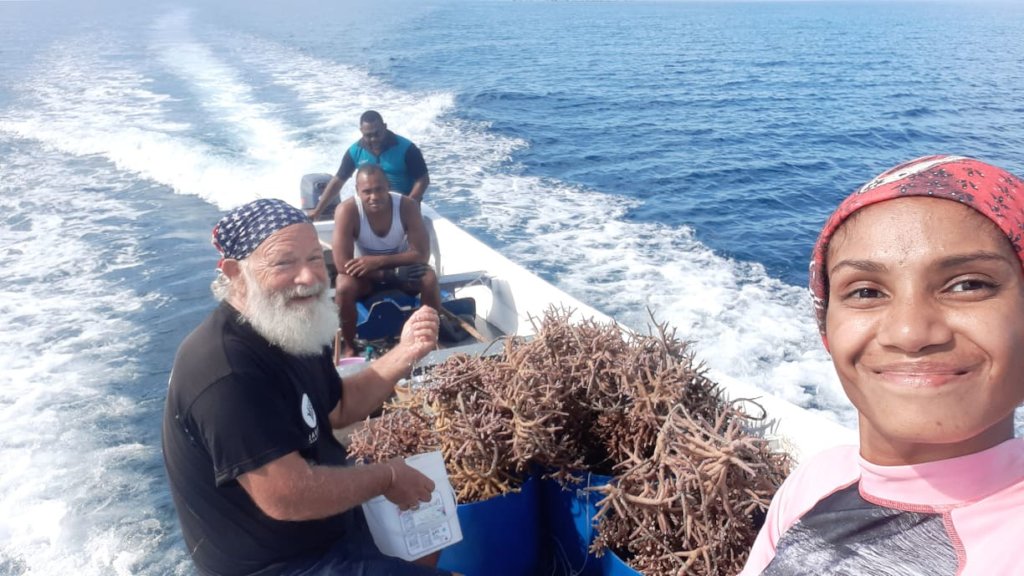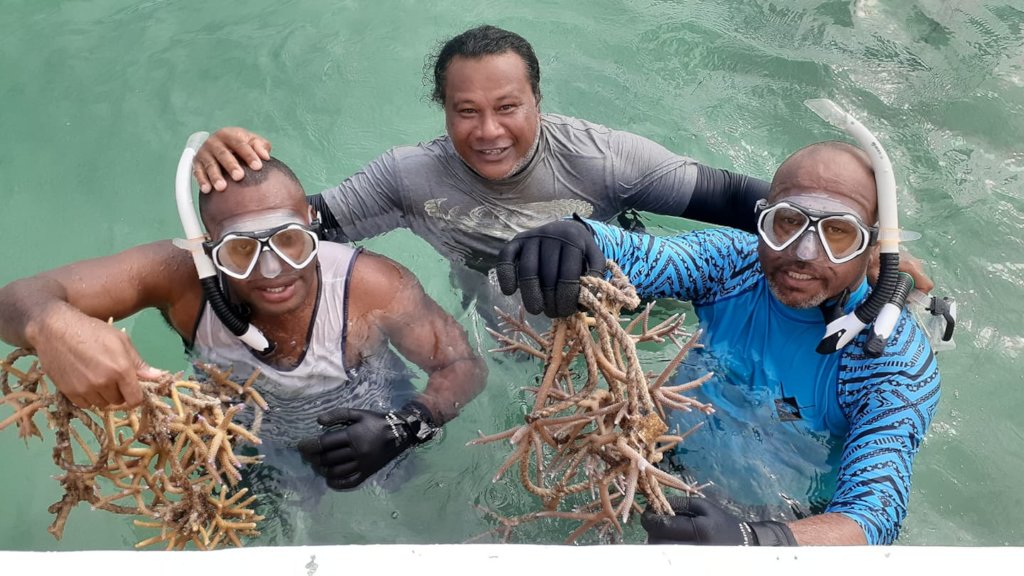By Austin Bowden-Kerby | Project Scientist, and defender of the corals
Virus Free Fiji--A Victory for Communities and the Corals
FINALLY we are able to get moving again. With the COVID-19 virus now absent from Fiji, the shut down has at last been lifted. We are now back in our Fiji sites and working hard. These sites went through a bleaching and a hurricane during the lockdown, with no one to maintain them. Fortunately, the nurseries did amazingly well; all five coral nurseries and reef restoration sites withstood this onslaught of Mother Nature, with relatively minor damage. The coral nurseries now contain thousands of bleaching resistant “super corals”, which are trimmed periodically to produce seed fragments for use in replanting patches of coral reefs after major bleaching kills the corals.
Here's a fascinating Corals 101 Fact: When we made the five nurseries, we saw astounding numbers of baby corals appear in the coming months, which researchers now say is related to the coral larvae being attracted to the smell of corals, and so we apparently created a strong settlement signal with our nurseries! So restoring the corals to a reef does not mean replanting the whole reef, but only to create a settlement signal with a few patches of concentrated corals.
For these Mamanuca Island sites, Corals for Conservation has been in a partnership with Plantation Island Resort for five years now, and the reefs around the resort have over time become a model training site, with the resort assisting with transport to the island, boats for the coral work, budget accommodation, meals, and free training venues. We have so far trained 38 Fijians to become professional coral gardeners, and two of these coral gardeners (Sarah and Merekelini), both University Marine Studies graduates, have worked as professional coral gardeners and guest marine educators at the resort for the past two years. Unfortunately, these women were laid off without pay in March due to the temporary closing of the resort, as Fiji stopped all incoming flights and all tourism. The resort was badly damaged by the cyclone, and all inter-island transport banned, so we were unable to do any coral related work. Once the ban on transport was lifted in early May, the resort went into intense action to repair the damage, so we were not yet able to come back in. When the major repairs were completed, the resort graciously invited me back, plus they brought the coral gardeners back on for two weeks of intensive coral work, which has just now been completed. Amazing progress was made: 1,000 corals were moved to safer waters free from "killer algae" smothering. We are all exhausted and nursing coral cuts-- I even sustained a bad toxic Crown of Thorns starfish poke to the finger.
Even though the resort is closed and without income, Plantation Island Resort has nevertheless agreed to provide housing, meals, boats for the work, and bi-weekly transport to and from the main island for our coral gardeners, if C4C can pay these two hard working women their wages. These stewardship efforts are so essential for the progress of critical reef restoration and nursery sites. We are writing up our results as a technical report and will be back soon, hopefully with a group of local trainees.
Professional Coral Gardeners Key to Reef & Resort Partnerships
While every resort has gardeners for the land, our goal is that all reef using resorts will take on coral gardeners for the sea, to care for the natural resources and to help the coral reef survive into the future. The coral gardeners work to counter any negative impact that tourists might have, while educating the guests, and helping the coral reef adapt to the warming waters caused by climate change. Our goal is for “Professional Coral Gardener” to become a certificate level profession and to create a hundred or more new jobs for bright young Pacific Islanders, so that pockets of coral reefs survive and thrive into the future under the care of loving and skilled hands.
As part of this initiative, and parallel to the strategy with the resorts, we work with indigenous reef-owning communities, considering them as a major part of the solution. We help by addressing poverty-driven overfishing of resources, and stimulating the restoration of fish and other marine resources, creating marine resource management plans, no fishing areas, and alternative livelihoods. The chiefs are interested in working with the tourism industry and government to create a permanent marine park for conserving the area, and C4C is facilitating this process.
Healthy coral reefs provide abundant fish, sandy beaches, and are a vital tourism resource. The biggest threat to the survival of coral reefs is Global Warming, as the ocean is becoming hotter with each passing year. Hot water causes the corals to become sick and to lose their colors- a process called bleaching. However, some corals are resistant to this bleaching, and can tolerate the hotter water. The reefs around Plantation Island Resort are very shallow, and have proven ideal for selecting hot water adapted, bleaching resistant “super corals,” and our nurseries are filled with a diversity of these amazing corals.
In partnership with the resort we have so far carried out three local workshops starting in 2016. Since 2019, we have run three international “Coral Gardening for Climate Change Adaptation” workshops, attracting over 75 people from as far away as Brazil, Malaysia, Papua New Guinea, Vanuatu, Samoa, Hawaii, Guam, Australia, Israel, and New Zealand. We are now going ahead and preparing to host our next series of Fiji-focused coral gardening training workshops at the resort, starting as early as July for Fiji. Then as flights reopen in the region, we plan to include regional trainees due to high demand for the program. We are submitting proposals to raise additional funding for this work, and the resort is willing to lower their charges to break-even cost, to help keep the resort functional.
During the Crisis Time an Opportunity to Re-invent Tourism Industry
This crisis is the best time to re-invent the tourism industry to become more sustainable and to better protect the environment. The tourism industry of the South Pacific greatly depends on the coral reefs, yet the old ways were damaging the environment. Coral gardening, if it is done by properly trained professionals, and as part of a wider conservation plan (and of course using the super corals), can help the corals survive into the future, while providing meaningful livelihoods for Pacific islanders.
JULY 15TH IS GLOBAL GIVING'S NEXT BONUS DAY: GIFTS FROM $250 TO $1,000 RECEIVE A 30% TO 50% MATCH.
Every gift is precious at any time. Your thoughtful donations continue to restore life to ensure a dynamic, thriving reef seascape--one of our planet's richest ecosystems.
Here's a link which includes a fun minute video from Northern Lau by Vatuvara Foundation: Watch--it's just like being with us> https://www.vatuvara.org/blog/2020/6/8/coral-restoration-in-northern-lau-for-a-healthy-and-safe-ocean?fbclid=IwAR05rltlFqB0tkTyNAbd9BYvtwZJPSUBOUj__kxYlW5hCPWtZr1EZ3mVEHM
Thanks for helping make this important work a reality,
Austin
Project reports on GlobalGiving are posted directly to globalgiving.org by Project Leaders as they are completed, generally every 3-4 months. To protect the integrity of these documents, GlobalGiving does not alter them; therefore you may find some language or formatting issues.
If you donate to this project or have donated to this project, you can receive an email when this project posts a report. You can also subscribe for reports without donating.
Support this important cause by creating a personalized fundraising page.
Start a Fundraiser
